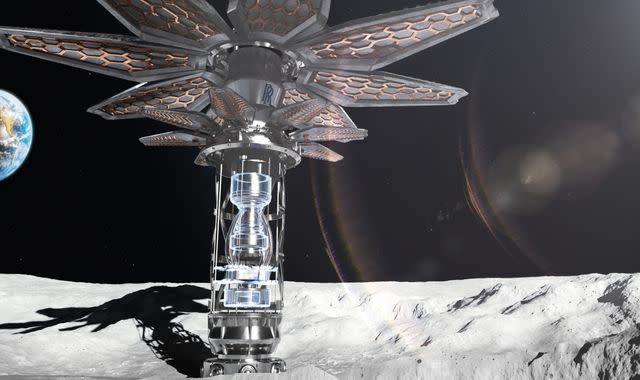Bangor University scientists design fuel for nuclear reactors on the moon

Scientists at a Welsh university have designed fuel which could sustain life on a base situated on the moon.
A team at Bangor University in north Wales has been conducting research which they say will make space travel safer and more efficient.
Rolls-Royce was given funding earlier this year to build a nuclear reactor for a lunar base.
NASA's Artemis mission aims to put astronauts - including the first woman - back on the surface by the end of 2025.
This will mark the first time astronauts step foot on the moon in more than 50 years.
But longer-term exploration of the moon's surface will require a way to power any future lunar base.
Professor Simon Middleburgh is part of Bangor University's Nuclear Futures Institute.
"We've been developing the bit in the middle of a nuclear reactor," he told Sky News.
"We're working with industry partners like Rolls-Royce, the National Nuclear Laboratory and international partners like NASA to develop these really compact little reactors that go sit on the moon."
The fuel has been created using TRISO particles - about the same size as poppy seeds - and could hold the key to sustaining life on a future moon base.
"The timescales for these are pretty short. We're looking at getting one of these reactors on the moon by the 2030s, so we really do need to get a wiggle on," Professor Middleburgh said.
"What we've been designing is the fuel to power these reactors.
"It's not just an ordinary challenge, it's not just standard nuclear fuel that you'd stick into your commercial electricity-generating reactor.
"It's got to deal with launch, it's got to deal with lots of forces on it. And it's then also got to be powering this reactor for 15 or so years."
The fuel will be subject to further tests and regulatory approval.
Sustaining a potential base on the moon is also a focus for India's historic mission to the south pole of the lunar surface, where a rover is searching for water ice that could be used for fuel, oxygen and drinking water.
Professor Middleburgh said being part of the research - led by Dr Phylis Makurunje - was "wicked".
"It's every kid's dream I think to play around with the space race and be involved with it," he said.
Read more:
Lunar lander successfully 'hops' on the moon
India launches rocket at sun after moon mission
Crashed lunar spacecraft likely caused new moon crater
But more people are needed to take on the challenge of developing space reactor fuel, according to Professor Middleburgh.
"We need more people around the UK to do it, we also need more people at Bangor to do it," he said.
"We developed this new general engineering programme for undergraduates to come in and start working on fun things like space reactors and nuclear medicine and all sorts of other things."

 Yahoo News
Yahoo News 
